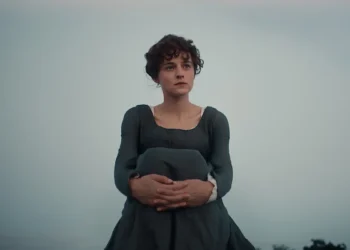Senna Hegde’s Avihitham stands out as a bold, intelligent satire that dismantles the myth of male loyalty and exposes the hypocrisy that often hides behind the so‑called “bro code.” Seamlessly balancing dark humour with social commentary, this Malayalam black comedy proves once again why Hegde is among the most perceptive storytellers working today.
While it doesn’t rely on laugh‑out‑loud moments, Avihitham earns its place through wit, irony, and sharp writing. It’s a deeply relatable study of patriarchy, rumour culture, and moral posturing, packaged within an engaging story that keeps you thinking long after the credits roll.
Story
Set in Ravaneshwaram, Kasaragod district, Avihitham revolves around a seemingly harmless rumour that spirals into a full-fledged moral inquisition. Local idler Prakashan (Ranji Kankol) accidentally spots a couple meeting in secret one night and identifies the man as Vinod (Vineeth Chakyar). Unable to see the woman’s face, he assumes she must be Nirmala (Vrinda Menon), the wife of Mukundan (Rakesh Ushar), who is away for work.
His gossip quickly spreads through the neighbourhood, drawing others into the mess — Venu (Unni Raj), a tailor who prides himself on recognizing women by their body measurements, Mukundan’s brother Murali (Dhanesh Koliyat), and several other men who all “confirm” Nirmala’s supposed infidelity without evidence.
What follows is a tragicomic portrayal of how rumours take on lives of their own when fuelled by ego, voyeurism, and insecurity. As the men devise a foolish plan to “unmask” Nirmala, the film transitions briefly into an edge‑of‑the‑seat thriller without losing its emotional anchor.
Performances
Every actor in Avihitham feels perfectly cast. Renji Kankol brings an unsettling charm to Prakashan’s nosy persona, while Unni Raj makes Venu’s hypocrisy both humorous and disturbing. Vrinda Menon’s subtle performance as Nirmala anchors the story with dignity and quiet strength. Rakesh Ushar and Dhanesh Koliyat also deliver noteworthy turns as men blinded by misplaced trust and male camaraderie.
Their collective energy gives the narrative authenticity, transforming a simple rumour into an exploration of betrayal and gendered prejudice.
Behind the Scenes
Hegde and co-writer Ambareesh Kalathera construct a small-town world full of prying eyes and misplaced moral superiority. The opening sequence — with men gossiping in the dark — instantly sets the tone for this biting social commentary.
Visually, Avihitham is striking. Sreeraj Raveendran and Ramesh Mathews craft realistic frames that capture the claustrophobic narrowness of small-town life, while Sreerag Saji’s music underscores the film’s shifts between irony, tension, and melancholy.
Senna Hegde’s direction, reminiscent of his Thinkalazhcha Nishchayam days, keeps the film rooted in realism. His decision to avoid unnecessary melodrama lets the writing breathe. The film’s opening quote — “They weigh us, they measure us, and then they decide our worth” — perfectly reflects its theme, connecting tailor Venu’s literal measuring to society’s figurative judgment of women.
Final Verdict
Avihitham is not a conventional comedy; its humour is observational and grounded. But its impact comes from how it exposes the collective blindness of men who mistake rumour for truth and loyalty for prejudice.
Senna Hegde’s film is a sharp reminder that oppression thrives when victims are turned against each other — and that the greatest threat to empathy often comes from within familiar walls.
With stellar performances, precise writing, and honest direction, Avihitham earns its place as one of the most intelligent Malayalam films in recent memory.























